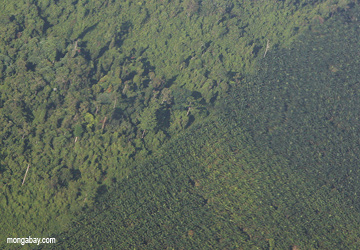An initiative that aims to root out deforestation by increasing the transparency of global supply chains released the results of its first survey on Wednesday, finding that most companies were not previously looking at the issue. Of 217 companies contacted by the Forest Footprint Disclosure project, only 35 responded with full data disclosure, including British Airways, BMW, Travis Perkins, L’Oréal, Weyerhaeuser, Kingfisher, Adidas, Nike, Mondi Marks & Spencer, Sainsbury’s, and Unilever.
“Revealingly, some companies who are communicating ‘environmentally friendly’ policy and messages in their consumer marketing mix, did not disclose their impact on forests,” Tracey Campbell, Director of FFD, said in a statement. “Whilst we understand that creating a robust and sustainable supply chain with full traceability is a challenge for businesses, those that have disclosed show that their forward-thinking management is managing a supply chain risk to their business over the long term and managing the issue of climate change intelligently.”
Lack of data was cited as a reason some companies did not respond. Campbell said that a number of non-responding companies in 2009 said they intend to participate in the 2010 survey.

Oil palm plantation and logged-over forest in Borneo. The palm oil industry has launched the Roundtable on Sustainable Palm Oil (RSPO) to devise certification standards for “greener” palm oil production. The cattle, timber, and soy industries have similar initiatives. |
“This is a very promising start in our first year”, Campbell said. “We have raised the profile of the links between deforestation and commodities, informing the business community about the issue, and we plan to build on this initial engagement in future years.”
FFD Project asks companies to “disclose how their operations and supply chains are impacting forests worldwide, and what is being done to manage those impacts responsibly.”
The disclosure information will be reported on an annual basis, enabling investors to identify possible risks related to a company’s “forest footprint.” Disclosure will also provide consumers with information to make better informed decisions about the products they purchase.
Participation in the project is free, but companies have to cover the cost of providing supply chain information. The scheme is modeled after the Carbon Disclosure Project, which asks companies to detail carbon emissions throughout their supply chain.
The initiative comes amid rising concerns over deforestation, which is a larger source of greenhouse gas emissions than all the world’s planes, trains, ships, cars, and trucks combined. While net forest loss has remained relatively constant over the past twenty years, there have been two significant shifts since the late 1980s: old-growth forests are being replaced by plantations and degraded, logged-over forests; and forest clearing is increasingly driven by industry rather than subsistence activities. A study released Sunday showed that urbanization and international trade are now bigger drivers of deforestation than poverty. The implication of this change is that consumers—through their buying decisions—have more power than ever to determine the fate of forests. If consumers show preference responsibly-sourced products, it will provide a signal to companies to establish credible and transparent supply chains. But in order to make smart choices, consumers need to be informed. FFD is a first step towards putting this sort of information in their hands.
“Consumers are increasingly aware of the issue of deforestation and are favoring those brands and companies which can demonstrate a clear link to sustainably sourced commodities. Investors will want to know which companies are facing up to the challenges.”
Related

Commodity trade and urbanization, rather than rural poverty, drive deforestation
(02/07/2010) Deforestation is increasingly correlated to urban population growth and trade rather than rural poverty, suggesting that measures proposed to reduce deforestation will be ineffective if they fail to address demand for commodities produced on forest lands, argues a new paper published in Nature GeoScience.
Concerns over deforestation may drive new approach to cattle ranching in the Amazon

(09/08/2009) While you’re browsing the mall for running shoes, the Amazon rainforest is probably the farthest thing from your mind. Perhaps it shouldn’t be. The globalization of commodity supply chains has created links between consumer products and distant ecosystems like the Amazon. Shoes sold in downtown Manhattan may have been assembled in Vietnam using leather supplied from a Brazilian processor that subcontracted to a rancher in the Amazon. But while demand for these products is currently driving environmental degradation, this connection may also hold the key to slowing the destruction of Earth’s largest rainforest.
Nike, Unilever, Burger King, IKEA may unwittingly contribute to Amazon destruction, says Greenpeace

(06/01/2009) Major international companies are unwittingly driving the deforestation of the Amazon rainforest through their purchases of leather, beef and other products supplied from the Brazil cattle industry, alleges a new report from Greenpeace. The report, Slaughtering the Amazon, is based on a three-year undercover investigation of the Brazilian cattle industry, which accounts for 80 percent of Amazon deforestation and roughly 14 percent of the world’s annual forest loss. Greenpeace found that Brazilian beef companies are important suppliers of raw materials used by leading global brands, including Adidas/Reebok, Nike, Carrefour, Eurostar, Unilever, Johnson & Johnson, Toyota, Honda, Gucci, Louis Vuitton, Prada, IKEA, Kraft, Tesco and Wal-Mart, among others.
Shift from poverty-driven to industry-driven deforestation may help conservation
(08/06/2008) A shift from poverty-driven deforestation to industry-driven deforestation in the tropics may offer new opportunities for forest conservation, argues a new paper published in the journal Trends in Evolution & Ecology.







